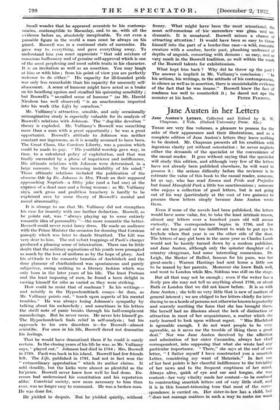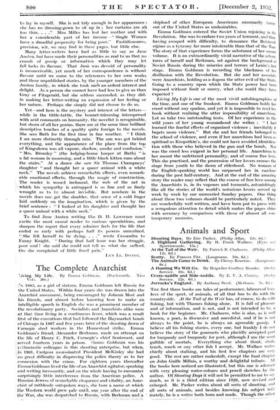Jane Austen in her Letters
Jane Austen's Letters. Collected and Edited by R. W. Chapman. 2 Vols. (Oxford•University Press. 42s.)
THESE are very fine volumes, a pleasure to possess for the sake of their appearance and their illustrations, and as a
complete edition of Jane Austen's letters they leave nothing to be desired. Mr. Chapman presents all his erudition with ingenious clarity yet without ostentation ; he never neglects
either the demands of the specialist or the convenience of the casual reader. It goes without saying that the specialist will study this edition, and although very few of the letters have not already been published elsewhere, he will want to possess it : the serious difficulty before the reviewer is to estimate the value of this book to the casual reader, someone, let us say, who has read Emma and Pride and Prejudice but found Mansfield Park a little too sanctimonious ; someone who enjoys a collection of good letters, but is not going out of his way (particularly at the cost of two guineas) to procure these letters simply because Jane Austen wrote them.
Even if none of the novels had been published, the letters would have some value, for, to take the least intrinsic reason, almost any letters over a hundred years old will arouse curiosity. The correspondence begins in 1796, and few of us are too proud or too indifferent to wish to put eye to keyhole when that year is on the other side of the door. The letters of any girl born in the same year as Charles Lamb would not be hastily turned down by a modern publisher, and Jane Austen, although only the spinster daughter of a country clergyman, had some interesting connexions. Dr. Leigh, the Master of Balliol, famous for his puns, was her great-uncle ; Warren Hastings had sent home a little son to be reared by her parents. Moreover she knew Bath well, and went to London while Mrs. Siddons was still on the stage.
But all that may not be enough ; even if the writer has a lively pen she may not tell us anything about 1796, or about Bath or London that we did not know before. It is so with Jane Austen ; she tells us very little that is new of matters of general interest ; we are obliged to her letters chiefly for intro- ducing to us a horde of persons not otherwise known to posterity and scarcely meriting the fame that she has brought them. She herself had no illusions about the lack of distinction or attraction in most of her acquaintance, a matter which she early learned to look upon without regret. " Miss Blachford is agreeable enough. I do not want people to be very agreeable, as it saves me the trouble of liking them a great deal." Nor was Jane Austen deceived by the affection and admiration of her sister Cassandra, always her chief correspondent, into supposing that what she wrote had any particular importance. " There," she says at the end of one letter, " I flatter myself I have constructed you a smartish Letter, considerin my want of Materials." In fact one of her best points is her cheerful indifference to the triviality of her news and to the frequent emptiness of her mind.. Always alive, quick of eye and ear and tongue, she was content—her very vitality made her content—to be confined to constructing smartish letters out of very little stuff, and it is in this bonnet-trimming tone that most of the corre- spondence, is carried on, Tier sister-in-law has a child, but "doe.s not manage-matters- in. such a way to- make me want-
to lay in myself. She is not tidy enough_ in her appearance ; she has no dressing-gown to sit up in her curtains are with too thin. . . ." Miss Miles has lost her mother and with her a considerable part of her income—" Single Women have a dreadful propensity for being poor." Fastidiousness, precision, wit, we may find in these pages, but little else.
Many letter-writers have had as little to say as Jane .Austen, but have made their personalities so real to us that no crumb of gossip or. information which they may „let fall lacks its flavour. That Jane was devoid of personality is inconceivable, yet much of her correspondence is without flavour until we come to the references to her own works and those unpublished stories, by the younger members of the Austen family, in which she took such an ardent interest and delight. As a person she cannot have had less to give us than Gray or Fitzgerald, but she seldom succeeded, as they did. in making her letter-writing an expression of her feeling or her nature. Perhaps she 'simply did not choose to do so.
Yet—and here is the mystery and interest of the letters—, while in the tittle-tattle, the bonnet-trimming interspersed with acid comments on humanity, the novelist is recognisable, but shorn of all her genius, there are at the same time brilliant descriptive touches of a quality quite foreign to the novels. She sees Bath for the first time in fine weather. " I think I see more distinctly through rain:- The sun was got behind everything, and the appearance of the place from the top of Kingsdown was all vapour, shadow, smoke and confusion." "Mrs. Bromley " (the lodging-house keeper at Bath) " is a fat woman in mourning, and a little black kitten runs about the stairs." At a dance she saw Sir Thomas Champneys' daughter " and thought her a queer animal with a white neck." The novels achieve remarkable effects, even remark- able emotional effects, through the magic of construction. The reader is wooed inchmeal, the web of the net in
which his sympathy is entrapped is so fine and so finely ' wrought as to be almost invisible. But nowhere in the novels does one get the shudder, that sense of a cold finger laid suddenly on the imagination, which is given by ..the brief sentence : " I looked at his daughter and thought her a queer animal with a white neck." .
To find Jane Austen writing like D. H. Lawrence must excite the most casual reader to curious speculations, and sharpen the regret that every admirer feels for the life that ended so early with perhaps half its powers unrealized.
She felt herself to be dying. . . ." wrote Cassandra to Fanny Knight. " During that half hour was her struggle, poor soul ! she said she could not tell us what she sufferd, tho she complaind of little fixed pain."
Lvx LL. IRVINE.











































 Previous page
Previous page